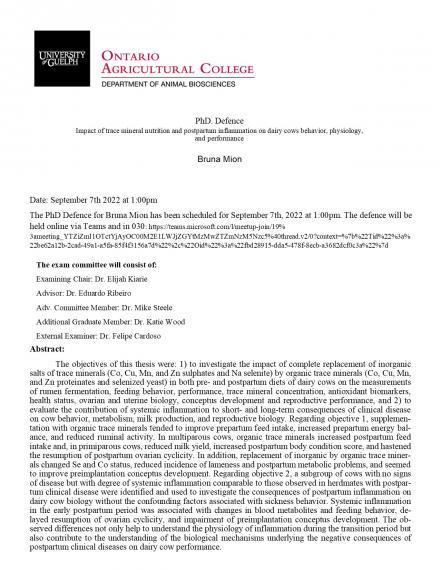Bruna Mion's PhD Defence
Date and Time
Location
Teams and room 030: https://teams.microsoft.com/l/meetup-join/19%3ameeting_YTZiZmI1OTctYjAyOC00M2E1LWJjZGYtMzMwZTZmNzM5Nzc5%40thread.v2/0?context=%7b%22Tid%22%3a%22be62a12b-2cad-49a1-a5fa-85f4f3156a7d%22%2c%22Oid%22%3a%22fbd28915-dda5-478f-8ecb-a3682dcf0c3a%22%7d

Details
The objectives of this thesis were: 1) to investigate the impact of complete replacement of inorganic salts of trace minerals (Co, Cu, Mn, and Zn sulphates and Na selenite) by organic trace minerals (Co, Cu, Mn, and Zn proteinates and selenized yeast) in both pre- and postpartum diets of dairy cows on the measurements of rumen fermentation, feeding behavior, performance, trace mineral concentration, antioxidant biomarkers, health status, ovarian and uterine biology, conceptus development and reproductive performance, and 2) to evaluate the contribution of systemic inflammation to short- and long-term consequences of clinical disease on cow behavior, metabolism, milk production, and reproductive biology. Regarding objective 1, supplementation with organic trace minerals tended to improve prepartum feed intake, increased prepartum energy balance, and reduced ruminal activity. In multiparous cows, organic trace minerals increased postpartum feed intake and, in primiparous cows, reduced milk yield, increased postpartum body condition score, and hastened the resumption of postpartum ovarian cyclicity. In addition, replacement of inorganic by organic trace minerals changed Se and Co status, reduced incidence of lameness and postpartum metabolic problems, and seemed to improve preimplantation conceptus development. Regarding objective 2, a subgroup of cows with no signs of disease but with degree of systemic inflammation comparable to those observed in herdmates with postpartum clinical disease were identified and used to investigate the consequences of postpartum inflammation on dairy cow biology without the confounding factors associated with sickness behavior. Systemic inflammation in the early postpartum period was associated with changes in blood metabolites and feeding behavior, delayed resumption of ovarian cyclicity, and impairment of preimplantation conceptus development. The observed differences not only help to understand the physiology of inflammation during the transition period but also contribute to the understanding of the biological mechanisms underlying the negative consequences of postpartum clinical diseases on dairy cow performance.